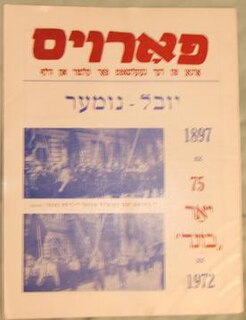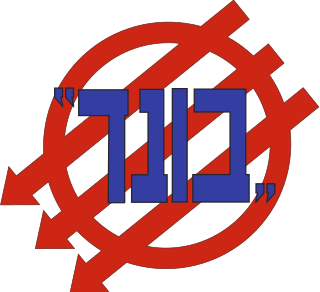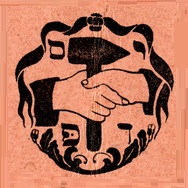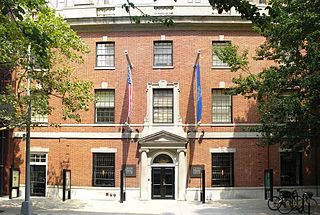 W
WBundism was a secular Jewish socialist movement, whose organizational manifestation was the General Jewish Labour Bund in Lithuania, Poland and Russia, founded in the Russian Empire in 1897.
 W
WThe General Jewish Labour Bund in Lithuania, Poland and Russia, generally called The Bund or the Jewish Labour Bund, was a secular Jewish socialist party initially formed in the Russian Empire and active between 1897 and 1920. In 1917 the Polish part of the Bund, which dated to the times when Poland was a Russian territory, seceded from the Russian Bund and created a new Polish General Jewish Labour Bund which continued to operate in Poland in the years between the two world wars. The majority faction of the Russian Bund was dissolved in 1921 and incorporated into the Communist Party. Other remnants of the Bund endured in various countries. A member of the Bund was called a Bundist.
 W
WArbeiter Fragen was a monthly journal of the Jewish Bundist (socialist) trade unions active in Poland in the 1920s and 1930s. It was published in Yiddish language, with some articles printed in Polish and Latinized Yiddish. Between 1930 and 1936 its lead editor was Szmul Zygielbojm
 W
WArbeiterstimme was the central organ of the General Jewish Labour Bund in Lithuania, Poland and Russia. It appeared from 1897 to 1905, as an underground publication. The Bund resumed the publication, now as a legal paper, after the February revolution.
 W
WThe Arbeter-ring in Yisroel – Brith Haavoda was the Israeli branch of the International Jewish Labor Bund, launched in 1951 and disbanded in 2019.
 W
WCamp "Hemshekh" was a Jewish summer camp in the United States that was founded in 1959 by Holocaust survivors who were active in the Jewish Labour Bund, a Jewish, socialist workers' party in Eastern Europe. The camp was sponsored by the Bund as well. Camp Hemshekh had as its goal instilling in its campers the ideals of the Jewish socialist movement that flourished in interwar Poland: socialism, secular Yiddish culture, equality and justice, and the Bundist concept of doikayt, "hereness," that Jews should live, build their culture and struggle for their rights wherever they dwell, rather than seeking refuge in a Jewish homeland. A Hemshekh camper is called a Hemshekhist.
 W
WDer Veker was a Yiddish language newspaper published from Minsk 1917–1941. Initially a Bundist publication founded in the midst of the 1917 revolutions, it continued publishing as a Communist Party organ until 1925.
 W
WMarek Edelman was a Polish political and social activist and cardiologist. Edelman was the last surviving leader of the Warsaw Ghetto Uprising and, long before his death, was the last one to stay in Poland despite harassment by the Communist authorities.
 W
WFor our freedom and yours (Polish: Za naszą i waszą wolność) is one of the unofficial mottos of Poland. It is commonly associated with the times when Polish soldiers, exiled from the partitioned Poland, fought in various independence movements all over the world. First seen during a patriotic demonstration to commemorate the Decembrists, held in Warsaw on January 25, 18311, it was most probably authored by Joachim Lelewel. The initial banner has the inscription in both Polish and Russian, and was meant to underline that the victory of Decembrists would also have meant liberty for Poland. The slogan got shorter with time; the original had the form 'In the name of God, for our freedom and yours' ('W imię Boga za Naszą i Waszą Wolność'). The original banner has been preserved in the collection of Muzeum Wojska Polskiego in Warsaw.
 W
WForoys was a Bundist fortnightly Yiddish-language newspaper published from Mexico City. In the early 1960s, it had a circulation of around 2,000. Editors included I. Rotenberg, S. Jezior and S. Tsfas. Foroys was the organ of the Gezelshaft far kultur un hilf.
 W
WThe General Jewish Labour Bund in Poland was a Jewish socialist party in Poland which promoted the political, cultural and social autonomy of Jewish workers, sought to combat antisemitism and was generally opposed to Zionism.
 W
WThe General Jewish Labour Bund in Romania was a Jewish socialist party in Romania, adhering to the political line of the General Jewish Labour Bund. Founded in 1922, shortly after the establishment of Greater Romania, it united Jewish socialists in Bukovina, Bessarabia and the Romanian Old Kingdom. Standing for the lay wing of the Jewish representative movement, the Romanian Bund had atheistic leanings and offered an alternative to the mainstream Jewish organization. Like other Bundist groups, but unlike the Marxist-inspired Poale Zion bodies of Bessarabia, it rejected Zionism.
 W
WThe International Jewish Labor Bund was a New York-based international Jewish socialist organization, based on the legacy of the General Jewish Labour Bund founded in the Russian empire in 1897 and the Polish Bund that was active in the interwar years. The IJLB is composed by local Bundist groups around the world. It was an "associated organisation" of the Socialist International, similar in status to the World Labour Zionist Movement or the International League of Religious Socialists. The World Coordinating Council/Committee of the Jewish Labor Bund was dissolved in New York in the mid-2000s., although local Bundist groups or groups inspired by the Jewish Labor Bund still exist in France, the UK, Australia and the State of Israel.
 W
WJewdas is a Jewish diaspora group based in London. It describes itself as "radical" and is described by The Jewish Chronicle as a "Jewish diaspora group, known for its far-left anti-Zionism". Describing its ideology as "neo-Bundist", it has a satirical-communal website and stages events in London and elsewhere.
 W
WThe Jewish Social Democratic Association Bund was a Jewish socialist organization in Bukovina, named after the Russian General Jewish Labour Bund.
 W
WThe Jewish Social Democratic Labour Organization in Argentina (Avangard) was a Jewish socialist organization in Argentina. Avangard was founded on January 20, 1907, by a group of Jewish socialists inspired by the General Jewish Labour Bund in Lithuania, Poland and Russia. The organization had its office on Mexico 2070, Buenos Aires.
 W
WThe Jewish Social Democratic Party in Galicia was a political party in Galicia and later also Bukovina, established in a split from the Polish Social Democratic Party of Galicia (PPSD) in 1905. The party made its first public appearance on May 1, 1905, with separate May Day rallies in Kraków, Lemberg, Tarnów and Przemyśl. However, as the new party stressed that it was not a competitor of the existing Social Democratic parties, they later joined the PPSD celebrations.
 W
WThe Jewish Socialist Federation (JSF) was a secular Jewish Yiddish-oriented organization founded in 1912 which acted as a language federation in the Socialist Party of America (SPA). Many of the founding members of the JSF had previously been members of the Bund in Eastern Europe and sought to bring Bundist politics to the socialist movement in the USA.
 W
WThe Jewish Socialists' Group (JSG) is a Jewish socialist collective in Britain, formed in the 1970s.
 W
WJutrzenka Kraków was a Jewish minority Polish football club during the interwar period. The club existed until 1939. Fans and players of the club were generally associated with the Bund political party. The main rival of Jutrzenka was the club Makkabi Kraków, which was associated with the Zionist movement and political parties. The matches between the two teams were generally referred to as "Holy War" long before that became a common reference to matches between Cracovia and Wisła.
 W
WKlain Bund was a youth organization in the Russian empire, connected to the General Jewish Labour Bund in Lithuania, Poland and Russia. Klain Bund was founded in 1903.
 W
WThe Kultur Lige was a secular socialist Jewish organization associated with the Jewish Labour Bund, established in Kiev in 1918, whose aim was to promote Yiddish language literature, theater and culture. The league organized various activities, including theater performances, poetry recitals, and concerts in Yiddish with the aim of disseminating Jewish art in Eastern Europe and Russia. Among some notable members of the organization were the scenic designer Boris Aronson, the artist and architect El Lissitzky, the writer David Bergelson, the sculptor Joseph Chaikov, the writer Peretz Markish, the poet David Hofstein, and Isaac Ben Ryback. Bergelson, Markish and Hofstein were later executed on Joseph Stalin's orders during the Night of the Murdered Poets, in 1952.
 W
WThe "Bund" in Latvia was a Jewish socialist party in Latvia between the two World Wars, adhering to the political line of the General Jewish Labour Bund.
 W
WMorgnshtern was a Jewish sports organisation in interbellum Poland, politically linked to the Bund. It was founded in the end of 1926. Morgnshtern increased significantly in influence in the period just preceding the Second World War. In 1937 the organisation had 107 local branches in different parts of the country. Its largest branch was based in Warsaw. In 1936, the Warsaw branch had 956 active members, in 1937 he membership reached around 1500 and 1855 in 1938.
 W
WOktyabr, was a Yiddish language newspaper published from Minsk 1917–1941.
 W
WThe Sotsyalistishe Kinder Farband or SKIF was founded in Eastern Europe as the youth organisation of the Jewish Labour Bund, a Jewish Socialist political party. S.K.I.F has three core ideological principles: Chavershaft, Doikayt, and Yiddishkeit. The plural form of a SKIF member is Skifistn and the leaders who run SKIF are the Helfers, aged 18-20.
 W
WThe Warsaw Ghetto Uprising was the 1943 act of Jewish resistance in the Warsaw Ghetto in German-occupied Poland during World War II to oppose Nazi Germany's final effort to transport the remaining ghetto population to Majdanek and Treblinka death camps.
 W
WThe Workers Circle or Der Arbeter Ring, formerly the Workmen's Circle, is an American Jewish nonprofit organization that promotes social and economic justice, Jewish community and education, including Yiddish studies, and Ashkenazic culture. It operates schools and Yiddish education programs, and year-round programs of concerts, lectures and secular holiday celebrations. The organization has community branch offices throughout North America, a national headquarters in New York City and approximately 11,000 members nationwide. It owns and operates a summer camp located in Hopewell Junction, New York called Camp Kinder Ring. It also runs an adult vacation campground facility, Circle Lodge, with bungalows and cottages, and a healthcare center in Bronx, New York.
 W
WDer yidisher arbeyter was a Yiddish-language periodical. It began as a Jewish workers journal in Vilna. In December 1896, Vladimir Kossovsky became the editor of the publication. With the sixth issue of the journal, published in March 1899, it became an organ of the General Jewish Labour Bund. The publication became the organ of the Foreign Committee of the Bund, and John Mill became its new editor. Der yidisher arbeyter became increasingly a theoretical publication, and its articles often dealt with issues relating to the national question in Central and Eastern Europe.
 W
WYIVO, established in 1925 in Wilno in the Second Polish Republic as the Yidisher Visnshaftlekher Institut, is an organization that preserves, studies, and teaches the cultural history of Jewish life throughout Eastern Europe, Germany, and Russia as well as orthography, lexicography, and other studies related to Yiddish. The English name of the organization was changed to the Institute for Jewish Research after its relocation to New York City, but it is still known mainly by its Yiddish acronym. YIVO is now a partner of the Center for Jewish History and serves as the de facto recognized language regulator of the Yiddish language.